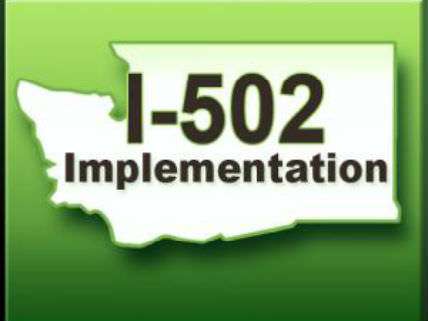How Much Will Legal Pot Cost in Washington?

When I interviewed UCLA drug policy expert Mark Kleiman about marijuana legalization in Washington a couple of months ago, he worried that the state-licensed stores will have trouble competing with black-market dealers and medical marijuana dispensaries. He called the projected price advantage for those alternative sources "a big problem," adding, "The legal market is going to have a hard time competing with the illegal market, but a particularly hard time competing with the untaxed, unregulated sort-of-legal market." Kleiman, whose consulting firm, BOTEC, was hired to advise Washington's marijuana regulators, now says he is more optimistic, partly because of the Justice Department's August 29 memo suggesting that federal prosecutors will refrain from interfering with legalization as long as regulations are strict enough, which Deputy Attorney General James Cole issued a few days after I talked to Kleiman. "I think the DoJ announcement makes a big difference," Kleiman says in an email message. "Of course things could change. But if they don't, we're going to see prices drop like stone."
Kleiman adds that BOTEC's June 28 projections suggesting that marijuana in state-licensed stores will cost two to three times what it costs in the black market were based on the assumption that legal pot would be grown indoors, which imposes additional regulatory and logistical burdens. But the Washington State Liquor Control Board later decided, perhaps partly in response to BOTEC's projections, to allow outdoor growing as well. "Marijuana as a dirt-farmed licit product will be dirt-cheap," Kleiman says.
Commenting on my recent Forbes column about marijuana taxes, Russ Belville, a longtime marijuana activist and writer, notes that BOTEC's projections also depend on assumptions about markups:
Those BOTEC analyses of $2 and $3 / gram production costs also included 100% markups at all three levels. What retailer is going to survive selling $482 ounces when, as noted, Seattle prices are currently less than half that? If production costs can't decrease, markup must decrease.
When BOTEC plugged in a reasonable markup found at a liquor store (31%) or other equivalent industries, the retail price of marijuana came down to something more like the current retail prices.
What about the liquor control board's goal of capturing just 25 percent of marijuana sales, which reinforces the impression that the black and gray markets will not only persist but dominate? Kleiman sees that goal as reasonable:
The I-502 system will have to compete with the untaxed and unregulated medical system as well as the illegal system. Under those circumstances, and given the start-up issues, capturing a quarter of the market initially seems like a prudent target. If the medical system is reined in, and if local law enforcement does its bit in shutting down illegal production, I'd expect a 90% market share for the I-502 stores within a couple of years.
I hope Kleiman and Belville are right that legal pot will not end up costing more than black-market pot, which strikes me as a perverse result suggesting something has gone terribly wrong with regulation and taxation. As Kleiman says on his blog, "legal cannabis will naturally be much, much cheaper than illegal cannabis." Making it more expensive therefore requires a real effort by government to screw thing up. But can anyone confidently predict that won't happen?


Show Comments (5)